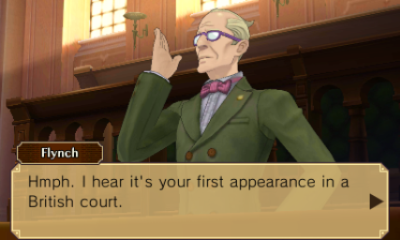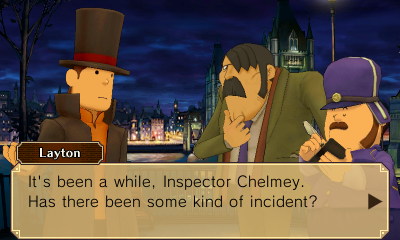Professor Layton Vs. Phoenix Wright is a combination that you would expect to work, and it does. Sort of. But it’s still a very mixed bag.
Starting off, the story serves to gel the two series together sensibly. There’re no magic portals between universes (I’m looking at you Mortal Kombat Vs DC Universe), and instead we’re shown the two characters in London, just missing each other while on the same case. I won’t spoil anything, but their paths finally cross once they find themselves in the mystery town of Labyrinthia, whose fate is dictated by the Storyteller. There, they must defend a girl accused of being not only a witch, but the Great Witch. Those capitals make all the difference.
 Moving to a magical location new to both series helps connect the characters, as both are put on the back foot: Layton challenged by the introduction of magic that combats his logic, and Phoenix having to work with a law system he doesn’t know. It adds up to make their teamwork and more necessary and believable. The overarching story is to save the girl, but along the way the narrative throws up some surprising twists that are genuinely unexpected. To sort the mess, you end up unravelling the mystery of Labyrinthia, and in all it’s pretty original.
Moving to a magical location new to both series helps connect the characters, as both are put on the back foot: Layton challenged by the introduction of magic that combats his logic, and Phoenix having to work with a law system he doesn’t know. It adds up to make their teamwork and more necessary and believable. The overarching story is to save the girl, but along the way the narrative throws up some surprising twists that are genuinely unexpected. To sort the mess, you end up unravelling the mystery of Labyrinthia, and in all it’s pretty original.
The crossover isn’t just an excuse to have both puzzles and the trial aspect in one game, either. Evidence found by Layton and Luke can be crucial in court, with the Professor and his apprentice gentleman even interjecting in the courtroom to help Phoenix. Likewise you’ll spend time exploring the town as Phoenix and his assistant Maya, solving puzzles and finding clues.
 The gameplay itself is what you would expect. The Professor sections have inventive puzzles, which contextually make sense with what’s going on at the time; a door will lead to a lock and key puzzle for example. There’s a nice variety to them as well, only a handful of times is a puzzle repeated out of the 60+ on offer. But while they’re all entertaining, they rarely challenge, and there’s often no punishment for getting them wrong. The hint system, making the jump from previous titles, throws this into sharp relief; at no point did I have to use more than one coin on a puzzle. It’s almost as if the developers were scared of making it too difficult, giving you more coins than you’ll use right from the start, on top of the two or three that litter every point and click section.
The gameplay itself is what you would expect. The Professor sections have inventive puzzles, which contextually make sense with what’s going on at the time; a door will lead to a lock and key puzzle for example. There’s a nice variety to them as well, only a handful of times is a puzzle repeated out of the 60+ on offer. But while they’re all entertaining, they rarely challenge, and there’s often no punishment for getting them wrong. The hint system, making the jump from previous titles, throws this into sharp relief; at no point did I have to use more than one coin on a puzzle. It’s almost as if the developers were scared of making it too difficult, giving you more coins than you’ll use right from the start, on top of the two or three that litter every point and click section.
The flip side of the gameplay is the courtroom sections. I’d never played a Phoenix Wright game before now, but I easily enjoyed the trails more than anything else. You hear a testimony, then cross examine the witness, picking holes in their argument either through evidence or other testimonies. When it all aligns – finding the contradictions in a witness testimony, using evidence to clear your client’s name – you feel as though you’re flying.
 It’s the “when it all aligns”, bit that’s the problem, though. While at their best the courtroom sections can feel slick as oil, at other times they can feel like a slog. Tapping through each witness testimony, then pressing each one and roaming through that dialogue, all the while trying to find the right moment to present evidence is just not that much fun. One later trial has you questioning ten witnesses at once. Each can be pressed and within that they can be cross-questioned from their reactions to each others’ testimonies. Sounds confusing? It is, and it smothers logical thinking, instead wading through textboxes to find the one statement that contradicts another.
It’s the “when it all aligns”, bit that’s the problem, though. While at their best the courtroom sections can feel slick as oil, at other times they can feel like a slog. Tapping through each witness testimony, then pressing each one and roaming through that dialogue, all the while trying to find the right moment to present evidence is just not that much fun. One later trial has you questioning ten witnesses at once. Each can be pressed and within that they can be cross-questioned from their reactions to each others’ testimonies. Sounds confusing? It is, and it smothers logical thinking, instead wading through textboxes to find the one statement that contradicts another.
Presenting the right evidence at the right time can be equally challenging, as sometimes the game will expect a leap of logic that just isn’t there, requiring the use of a hint coin to provide a clue. Other times you’ll reach the conclusion before you’re meant to; once I tried presenting evidence too early and received a penalty. Instead I had to move one frame further and present then. It takes the shine off an otherwise great system.
 The crossing of series would also make the tutorial system a little more natural, with the Professor being new to a courtroom atmosphere for example, were it not for the fact you are taught how to play each side of the game separately back in London before the characters meet. This wouldn’t be so bad – Phoenix’s cluelessness is explained by it being an English court, the puzzles by it being Luke rather than Layton solving them – but the game decides to painstakingly explain how to play it again once you get to Labyrinthia, under the guise of explaining to the characters. While it is useful for some techniques (multiple witness questioning for Phoenix for example), it kills the pacing, with drawn out, un-skippable descriptions stopping it dead.
The crossing of series would also make the tutorial system a little more natural, with the Professor being new to a courtroom atmosphere for example, were it not for the fact you are taught how to play each side of the game separately back in London before the characters meet. This wouldn’t be so bad – Phoenix’s cluelessness is explained by it being an English court, the puzzles by it being Luke rather than Layton solving them – but the game decides to painstakingly explain how to play it again once you get to Labyrinthia, under the guise of explaining to the characters. While it is useful for some techniques (multiple witness questioning for Phoenix for example), it kills the pacing, with drawn out, un-skippable descriptions stopping it dead.
Pacing is the biggest issue for Professor Layton Vs Phoenix Wright. While story is essential for this kind of game, at times it feels like you’re clicking through textboxes for ages. This is coupled with the point and click sections that amount to scrolling over the screen for a few seconds until the icon changes. It all starts to feel monotonous. It’s a shame as well that chasing the story leads to this, because not only is it well written, but the occasional cutscenes thrown in are downright gorgeous, and the voice acting that accompanies certain climatic moments is superb.
 The art style is great throughout, in fact. The two series bring their own styles with them, most of the game taking Phoenix Wright’s lead with its more traditional manga roots. It means that Layton and Luke stand out to start with, but you soon get used to it. The animation brings the world alive, witnesses breaking down under questioning or the opposing lawyer getting riled up all add a bit of character to the text. Professor Layton Vs. Phoenix Wright is value for money too. It would be fair to expect a regular length title, half-Layton, half-Wright, but in reality it is more like two full length games, one from each series.
The art style is great throughout, in fact. The two series bring their own styles with them, most of the game taking Phoenix Wright’s lead with its more traditional manga roots. It means that Layton and Luke stand out to start with, but you soon get used to it. The animation brings the world alive, witnesses breaking down under questioning or the opposing lawyer getting riled up all add a bit of character to the text. Professor Layton Vs. Phoenix Wright is value for money too. It would be fair to expect a regular length title, half-Layton, half-Wright, but in reality it is more like two full length games, one from each series.
VERDICT: Fittingly, the combination of the two series is a logical one. You use puzzles to find evidence to support a case, and it all makes sense, which is vital for this kind of crossover. Similarly, creating a new setting blends the world together better than making only one of them a fish out of water. But while the crossover may make sense, neither the Layton or the Wright sections are perfect. It’s all a bit too “entry level” on both counts.
This would be forgivable if the story was engaging enough to drive things, but it tends to devolve into a slog from one puzzle to the next, with the occasional trial in-between to brighten it up. It’s worth a go if you’re a fan of either series, and you won’t be disappointed by the story – just be prepared to invest plenty of time to see it through.

GOOD. A game that scores 7/10 is worthy of note, but unworthy of fanfare. It does many things well, but only a few of them incredibly well and, despite a handful of good qualities, fresh ideas and solid mechanics, it fails to overwhelm.
Review code provided by publisher.





